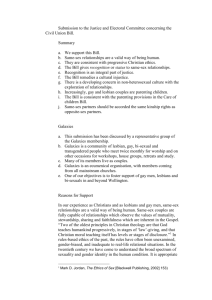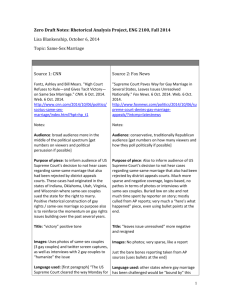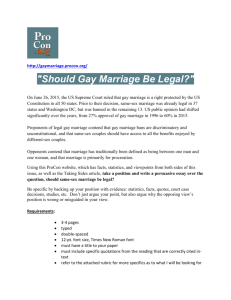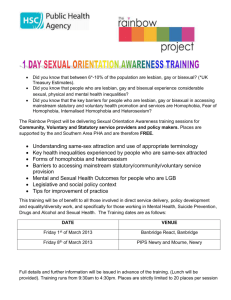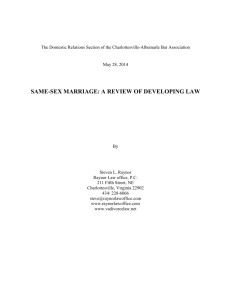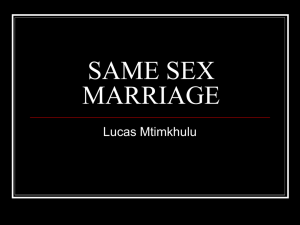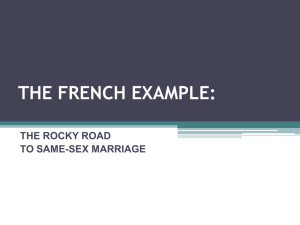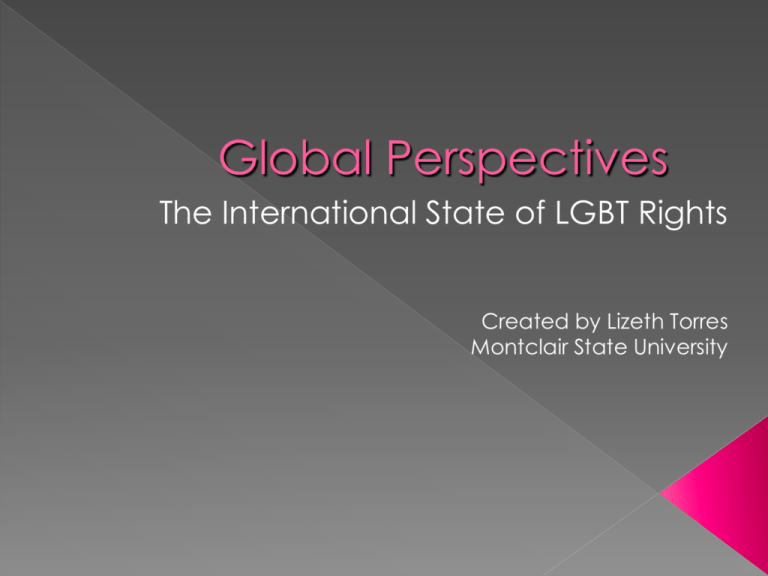
Global Perspectives
The International State of LGBT Rights
Created by Lizeth Torres
Montclair State University
COLUMBIA
Congress
in Colombia have approved a
bill to grant homosexual couples the
same rights to social security benefits as
heterosexual couples.
Although
Same-Sex marriage is not legal
in Columbia, the current Columbian
government is very
progressive and will most
likely allow for marriage
equality soon.
PAKISTAN
• Gay marriage is not legal in
Pakistan.
• Pakistani law punishes sodomy with
imprisonment ranging from two years
to life.
• Some Islamic provisions prescribe 100
lashes for the act or
even death by
stoning.
CANADA
• Canada offers its LGBT citizens more
legal rights than do many other
nations where homosexuality is legal.
• Since 2005, Canada has offered civil
marriage rights
nationwide to
same-sex couples.
PERU
• In
Peru, Homosexual acts among consenting adults
are legal. An exception is made for all military and
police personnel, who can be punished with between
60 days to 20 years imprisonment or discharge from
the forces.
• Homosexuality can also be used as grounds for
separation or divorce. Laws meant to protect "public
morals" are often used against lesbians and gays.
• Society's attitude towards
homosexuals is generally hostile
and is heavily influenced by the
Catholic Church.
BRAZIL
•A panel of judges in a Brazilian state
ruled in favor of same-sex marriages in
2004.
• The southern state of Rio Grande do Sul
is the first state to do so. The ruling gives
same-sex couples broad rights in areas
like inheritance, child
custody, insurance &
benefits and pensions.
KENYA
• On Wednesday, 10th September, 2008, police arrested 2
Female to Male transgender individuals in Kampala. The
two individuals are still in custody and are being held
without charge. They have been denied bail. Moreover,
the Police and CID are now on the hunt for other LGBTI
individuals.
• Kenyan Penal Code criminalize homosexual behavior
and attempted homosexual behavior between men,
which is referred to as "carnal knowledge against the
order of nature". The penalty is 5 to 14 years' imprisonment.
• In Kenya, Homosexuality is
against norms and traditions,
even in religion it is
Considered a great sin.
ICELAND
• The majority of the public is supportive
of homosexuality.
• In February 2009 a minority government took office,
headed by Johanna Siguroroardóttir, the world's first
openly gay head of government in modern times.
• Laws governing homosexuality were repealed
in 1940. In 1992 the age of
consent was made equal
for everyone, regardless of
gender or sexual orientation.
CHINA
• Same-sex marriage is not legal in China. The
Chinese government does not explicitly state
whether same-sex marriage is legal or not.
• The Marriage Law of the People's Republic of
China does not allow adoption by same-sex
couples.
• China is seeing record
numbers of new HIV
infections and gay
Chinese are seen as a
high-risk population.
PORTUGAL
• The Portuguese Civil Code currently bans samesex marriage, even though cohabitating
same-sex couples are afforded several of the
rights of marriage
• Healthcare: An internal regulation of the
Portuguese Institute of Blood excludes gay men
from donating blood. In April 1999, the Institute's
president justified the
exclusion on the basis of
an alleged high level of
promiscuity among gay
people.
RUSSIA
• Gays are often attacked and ridiculed on the streets of
Russia and therefore many live in secret.
• Today, being gay or lesbian in Russia is no longer illegal,
but still considered a "perversion".
• In February 2007, Mayor Yuri Luzhkov banned what was
to be the first gay pride parade in Moscow, claiming
gays are unnatural and "satanic"
• Same-sex marriage is illegal in
Russia. Marriage traditions are
heavily influenced by the Russian
Orthodox Church, which sees
homosexuality as a perversion.
MEXICO
•Homosexuality has never been explicitly banned
in Mexico. In 1991, the Mexico Constitution was
amended to prohibit discrimination based on
sexual orientation.
• Same sex civil unions were legalized in Mexico
City in November 2006. There is, however, some
opposition to gay marriage in more conservative
regions of Mexico.
• Gay adoption is still
prohibited in all of Mexico.
UNITED KINGDOM
• Discrimination on the basis of both sexual
orientation and gender identity is illegal in
housing, employment and the provision of goods
and services.
• LGBT individuals can serve openly in the army.
• Same-sex couples have had the right
to adopt since 2002 and to enter into civil
partnerships since 2005.
• The Gender Recognition
Act also gave transsexuals
the right to change their
legal gender.
INDIA
• On July 2, 2009, the Indian High Court
decriminalized homosexuality.
• Indian law does not recognize same-sex
marriages, nor does it provide for civil
unions.
• Conservative views among many of the
nation’s politicians, argue the previous ban
on gay sex protected
public health and morals.
HONDURAS
• Both male and female same-sex sexual activity
is illegal in Honduras.
• LGBT people have been subjected to grave
human rights violations in Honduras for many
years, including killings and discrimination in the
exercise of their civil, political, social and
economic rights
• Both same-sex marriages
and same-sex adoption
have been constitutionally
banned since 2005.
IRAQ
• Members of the LGBT community (or those
perceived to be LGBT) have being tortured, assaulted,
arrested, detained, killed, or shot in the face and left
to die.
•According to Human Rights Watch "While the
country remains a dangerous place for many if not
most of its citizens, death squads started specifically
singling out men whom they considered not "manly"
enough, or whom they suspected of homosexual
conduct. The most trivial details
of Appearance. The length of
A man's hair, the fit of his
clothes could determine
whether he lived or died."
SPAIN
• Homosexuals and Bisexuals are Forbidden to Donate
Blood Because of Their Sexual Orientation
• Lesbian and Gay activists are pushing forward with a
campaign to convince their government to enact
legislation allowing same sex civil unions
• On June 23, 2000, the Parliament in the autonomous
region of Navarra, Spain, passed a ground-breaking
law allowing all registered couples in Navarra
(including same-sex couples)
to adopt children, enjoying
the same rights and
obligations as heterosexual
married couples.
GHANA
• About half of Ghanaian men who have sex with
other men are also having sex with women, creating a
potential 'crossover' for HIV/STDs between the gay and
heterosexual populations here.
• On September 1, the government of Ghana issued a
statement banning a lesbian and gay conference
and instructing the Ministry of the Interior to locate and
arrest the conference's local organizers.
• Homosexuality, lesbianism
and bestiality are punishable
Offences under the laws of
Ghana."
PUERTO RICO
• Puerto Rican Penal code criminalizes
consensual sexual relationships between
people of the same sex.
• Marriage just between a man and woman
is the only type of marriage recognized in
Puerto Rico.
NICARAGUA
•Article 204 of the Nicaraguan Penal Code states that:
“Anyone who induces, promotes, propagandizes or
practices in scandalous form sexual intercourse
between persons of the same sex commits the crime of
sodomy and shall incur 1 to 3 years' imprisonment.”
•Despite efforts from Pro-LGBT rights groups and Amnesty
International to de-criminalize homosexuality, President
Enrique Bolaños has allegedly ordered that a list of all
members of his government
"suspected" of being part of
the "gay-lesbian world" be
compiled so he can dismiss
them before leaving office
in January 2007
UNITED STATES
•Openly lesbian and gay members of the US military are subject to
the US's "Don't ask, don't tell" policy
•Six states currently offer marriage to same-sex couples.
•Adoption policies in regards to gay and lesbian parents vary
greatly from state to state.
•California performed same-sex marriages in 2008, but in Nov. of
that year, voters passed Proposition 8, banning same-sex marriage
in the state through an amendment to the state constitution.
•The Matthew Shepard Bill was passed
on October 22, 2009, that would
expand the 1969 United States federal
hate-crime law to include crimes
motivated by a victim's actual
or perceived gender, gender identity,
sexual orientation, or disability.
Information obtained from:
•The International Gay and Lesbian Human Rights
Commission
•The International Lesbian and Gay Association
•Amnesty International


